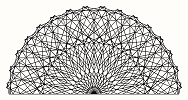


 |
 |
 |
Evolution that goes back a ways is studied almost entirely through fossil bones. There is a lot of missing information that can be filled in when adding physiology to evolution. The evolution of humans has been restricted to fossil bones which primarily come from Kenya. That's not where humans evolved. They evolved along the Southwest coast of Africa. The rough coastline did not leave fossil bones to be found in that area. So physiological evidence must be used instead of fossils to evaluate that evolution. There is a skip in fossil evidence that shows up in caves in central South Africa. The link between Kenya and South Africa would go through the Southwest coast of Africa, where the critical transformations occurred. It is known that a higher protein diet resulting from herbivores transforming into omnivores was important in early human evolution. It's not clear why herbivores transformed into omnivores when looking at fossil bones only. The physiology explains the missing evidence. The most important factor in explaining the transition to human characteristics is zinc. The most critical thing zinc does is strengthen the immune system. A strong immune system gave the evolving humans longer lives, which was instrumental in developing complex relationships between each other and between humans and their environments. In other words, knowledge takes time to acquire; and the ability to disseminate knowledge takes time for teaching. Resisting disease gave humans the age that is needed for increasing their use of knowledge. So the first question is what zinc does for the immune system. One of the difficult tasks of the immune system is killing disease organisms and breaking down foreign material. Super oxide is synthesized for that purpose. Zinc replaces super oxide in a vastly superior manner. It's like having to create pottery each time a person eats compared to re-using porcelain plates each time. Pathogens have to be killed somehow. For herbivores super oxide was used for that; but it was hard to produce and not a catalyst. That means the supply of super oxide would run out during a disease, just when it was needed the most. By contrast, zinc is a catalyst; it never runs out. So zinc greatly improved the ability to fight disease and create longevity for the ancestors of humans. Zinc is the strongest oxidizing agent that metabolism can easily handle. Copper is much stronger, but it is very toxic for metabolism. Copper is used to keep fence posts from rotting in the ground. Copper is needed in cytochromes, but getting it there is difficult, which creates problems in taking copper as a supplement. Zinc is an instant replacement for super oxide, and it can be used over and over without being resynthesized through metabolic processes. Zinc is so fast that it is noticeable that taking zinc will cause pains to disappear in a few minutes. Pain is caused by chemicals that have to be gotten rid of by breaking them down. If not, the pain chemicals accumulate causing pain to needlessly spread and persist. The immune system is supposed to break those chemicals down to prevent the persistence of pain; but the white blood cells often get overwhelmed and do not get the job done. Taking zinc gets those chemicals broken down rapidly. All herbivores have a shortage of zinc, because there is almost no zinc in the plants being eaten. Carnivores get more zinc, because the metal accumulates in animals. The situation is similar to mercury in the oceans. large fish accumulate mercury. Similarly, animals accumulate zinc. When the great apes started to move around, they would have stumbled onto the large number of shore birds in Southwestern Africa. The eggs would have been easy pickings. The eggs would have had quite a bit of zinc in them. Then nearby were a lot of accessible sea creatures including muscles and clams. They would have had even more zinc. So the great apes that migrated into the area of Southwest Africa would have gotten more zinc in addition to more protein in their diets. The increased zinc was so valuable that it hijacked the copper absorbing physiology. As a result, humans cannot take both zinc and copper at the same time. Taking zinc will create a copper shortage, unless the two metals are spaced out by several hours. Due to the toxicity of copper, the best way for humans to get copper is in red meat. Plants have very little copper. Taking copper in mineral form will oxidize food creating indigestion. Copper taken without food would get absorbed too fast and damage the liver. So if copper is taken in mineral form, it could be combined with white rice. Oxidation of starch does not produce the degree of toxicity of oxidized nitrogen containing molecules. The increased availability of both zinc and protein in the Southwestern coast of Africa would have resulted in humans developing their larger brains and social interactions. As the hominids spread out from that area, they would have entered the caves in the central South Africa area where fossil bones are found for the transitional types. Only later would they have migrated into the area of Kenya where most of the transitional fossils are found. Evidence for these locations is in omega three fatty acids which human brains require. Sea creatures produce the type of omega three fatty acids that human brains require. When humans migrated back into the jungles, they acquired alpha linoleic acid which is a shorter-chain version of omega 3 found in fish. Alpha linoleic acid has to be converted into the longer-chain type omega three fatty acid for human brains. If humans didn't evolve their brains near the sea coast, they would not have acquired their dependency upon omega three fatty acids of the type found in fish (which originate in marine algae). The southwestern coast of Africa, where shore birds and marine life are heavy, is extremely arid with no forested areas nearby. This means the great apes evolving into humans in that area were isolated from their relatives in the forests. The isolation promoted the divergence of evolution. And it increased dependence upon high protein diets without plant-based foods. An important thing to understand is that evolution is minimalist. That means any slight improvement will be favored by evolution. Zinc is an example of minimalism in evolution. There is not a large increase in zinc availability for carnivores over herbivores. Evolution responds to that small improvement. What it means is that humans benefit from taking more zinc than is normally found in their diet. In fact, a lot of persons would have a shortage of zinc. The primary source of zinc in normal diets would be livestock which are fed zinc. There is no requirement for livestock producers to feed zinc. Vegetarians would always be low in zinc if they don't take zinc supplements. But zinc is such a strong oxidizing agent that it is somewhat toxic as a supplement. In fact, all vitamins and mineral supplements are toxic in large quantities until they get to their final destination. A method of reducing the problem of toxicity with metals is to eat only a small amount of rice with them, because rice is almost pure starch, so the oxidation is less harmful than reacting with complex nutrients. I find preliminary indications that vitamin C reduces zinc to an unusable and perhaps toxic form, which might mean the plus one cation or even the unionized metal. If so, vitamin C should not be taken before or after zinc is taken. Iron however does need vitamin C to prevent it from oxidizing to the plus three cation which is very toxic. So vitamin C needs to be take with iron but not with zinc.
|
|
||||||||||||||||||
 |
 |
 | ||
 |
 |
 |
||